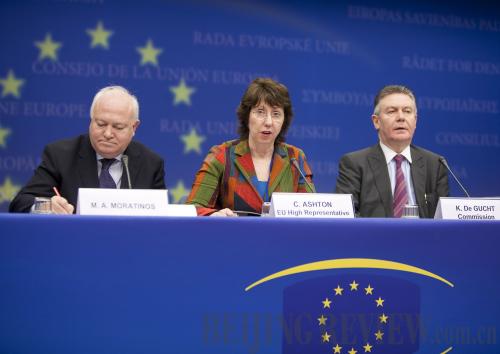|
 |
|
COURTESY OF KERRY BROWN |
Catherine Ashton was appointed as the EU's new high representative for foreign affairs and security policy by the 27 member states of the union last November. The announcement surprised many. Better-known names such as current British Foreign Minister David Miliband and former Governor of Hong Kong Chris Patten had been suggested. Ashton's previous career had been as the Labour Party leader of the British House of Lords, and before that in the British National Health Service. In both, her main focus was on UK domestic issues.
Her job as trade commissioner did give her international experience, but during her hearing before the European Parliament in January 2010, one of the main issues that members concentrated on was her lack of foreign policy exposure. One German member of the European Parliament (MEP) complained after her appearance he had no clearer idea on what her vision for the EU in the world was, and where she wanted to take the union in global relationships. But, crucially, she dealt with most of the questions put to her reasonably confidently. Having passed this test, she must now proceed to implement the sections of the Lisbon Treaty relevant to her brief.
 |
|
ONE VOICE: Catherine Ashton, High Representative of the EU for Foreign Affairs and Security Policy, at a press conference on helping Haitian earthquake relief at the EU headquarters in Brussels on January 18, along with Spanish Minister of Foreign Affairs and Cooperation Miguel Angel Moratinos and Karel De Gucht, at the time European Commissioner for Development and Humanitarian Aid (XINHUA) | That means establishing, somehow, a new European diplomatic service. It is still not entirely clear how she will do this. As U.S.-based Irish scholar Perry Anderson wrote in his recently published study of Europe, The New Old World, the EU is frequently a mystery to its own citizens, let alone those outside of it. At least until the Lisbon Treaty took effect in December 2009 it consisted of four main pillars: the European Commission, a group of officials who administer and run the EU's affairs; the European Parliament, elected by citizens across the 27 member states with widely different levels of turnout; the European Court of Justice; and finally the Council of Ministers, where the relevant leaders in each area of the 27 states meet at a higher level, almost along the lines of a cabinet, to decide key policy issues. Despite much criticism from some member states, in fact the bureaucracy that runs this huge entity is small—18,000 people at most. And they run it on a surprisingly small budget, less than 1 percent of the EU's GDP.
The Lisbon Treaty reconfigures the power and functions of these four pillars. The European Parliament is now upgraded, having powers like congresses in most places, sanctioning and scrutinizing new legislation. From this arises the right of the MEPs to question Ashton, and to authorize her final appointment. But there is some confusion over how the current parts of the European Commission dealing with external affairs will function once a new European diplomatic service is set up. New entry procedures for EU diplomats need to be decided, along with issues about how many people each country can have, and what sort of representation is needed at the highest level. Already the UK is anxious because its quota of current EU officials at a senior level is falling. These issues need to be set out over coming months.
A vision on China
Ashton takes China seriously. When she was EU trade commissioner she made several visits to China, the last in September 2009, where she co-chaired an EU-China trade dialogue with Vice Premier Wang Qishan. But just as it is not clear what her overall vision of the EU's global role is, so it is not clear where China fits into how she sees the EU's priorities over the next few years.
Reports that she has been reading Mark Leonard's short 2008 book What Does China Think? at least reveal that she is starting to think in more depth about this issue. Leonard was one of the policy thinkers most favored by the new Labour government during and after its election in 1997 after 18 years out of power. He set up with others the Foreign Policy Center, which had, in particular, close links with the then British Foreign Secretary, the late Robin Cook. Leonard in particular argued for the EU being a model for the rest of the world to look at, including the United States, in terms of how it delivered accountable, transparent and stable governance. In Why Europe Will Run the 21st Century he argues that "those who believe Europe is weak and ineffectual are wrong...Europe is remaking the world in its own image through its unique 'transformative power.'"
|
